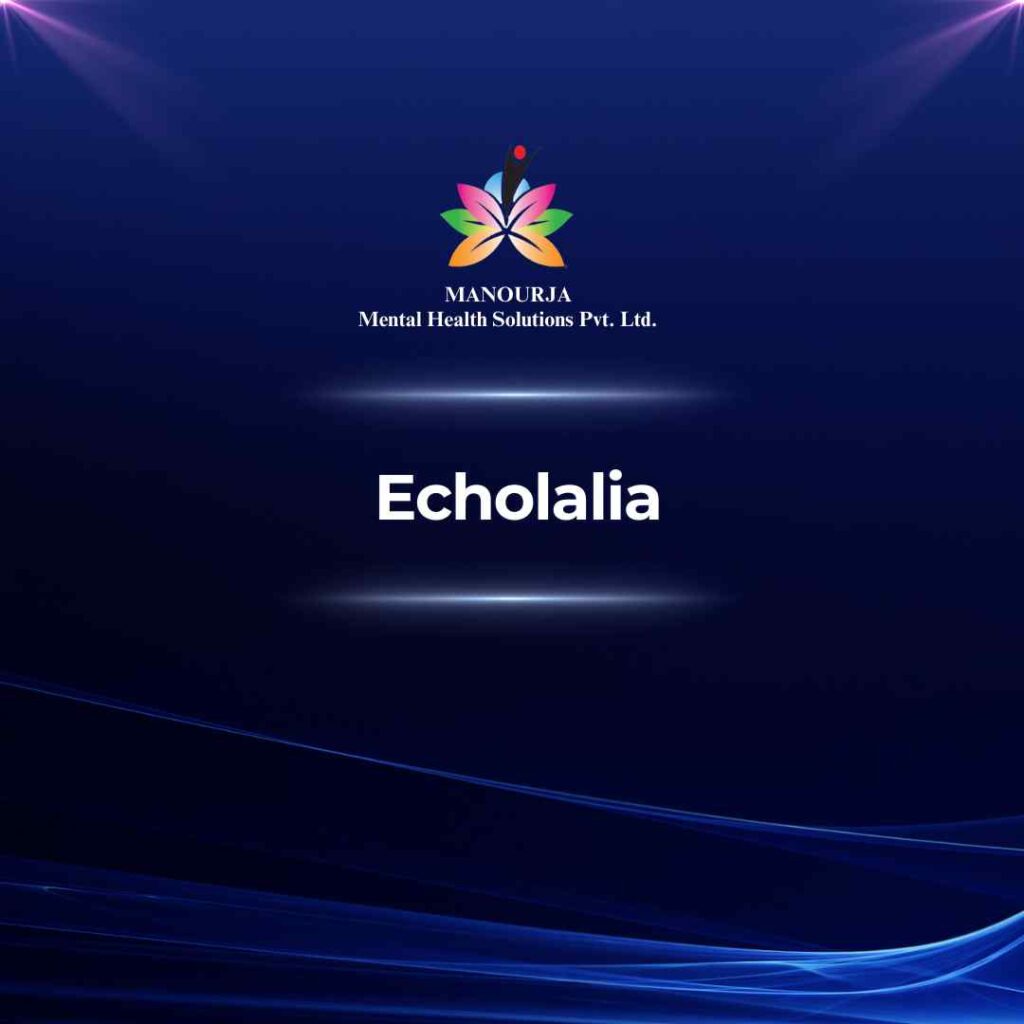Echolalia

Echolalia is the involuntary repetition or imitation of another person’s spoken words. It is a common speech phenomenon in early childhood development, typically seen in children learning to speak. However, when echolalia persists beyond the developmental stage, it can be indicative of underlying neurological or psychiatric conditions. Echolalia can be immediate, occurring right after the heard phrase, or delayed, where the repeated phrase might be echoed after a significant time lapse.
Echolalia as a Sign and Symptom of Mental Illness
Echolalia can be a prominent symptom in various mental and neurological disorders. It is often a coping mechanism or an attempt to communicate when other forms of speech are challenging. Echolalia can serve different functions, such as self-stimulation, communication, or comprehension of spoken language. The presence of echolalia, particularly when persistent or contextually inappropriate, can indicate an underlying issue requiring medical or psychological attention.
Mental Illnesses and Conditions Associated with Echolalia
Autism spectrum disorder is one of the most common conditions associated with echolalia. Individuals with ASD may use echolalia to process language, communicate needs, or reduce anxiety. Echolalia in autism can be functional, helping in learning language, or non-functional, serving more as a repetitive behavior.
In schizophrenia, echolalia can occur during episodes of psychosis or in the presence of severe thought disorders. It is often part of a broader spectrum of speech abnormalities, such as disorganized speech or catatonia.
- Tourette Syndrome
Tourette syndrome, characterized by repetitive movements and vocalizations (tics), can include echolalia as a vocal tic. Individuals with Tourette syndrome may involuntarily repeat phrases or words spoken by others.
- Aphasia
Aphasia is a condition often resulting from stroke or brain injury, affecting language production and comprehension. Echolalia can occur in certain types of aphasia, such as transcortical sensory aphasia, where individuals might repeat what they hear due to impaired language processing.
- Alzheimer’s Disease and Other Dementias
In Alzheimer’s disease and other forms of dementia, echolalia can manifest as a symptom of cognitive decline. It often reflects underlying impairments in memory, language comprehension, and the ability to generate spontaneous speech.
Children with developmental language disorders may exhibit echolalia as they struggle to develop typical language skills. Echolalia in these cases can be a stepping stone in language acquisition, helping the child learn and practice speech.
In obsessive-compulsive disorder, echolalia can be part of compulsive speech patterns. Individuals with OCD may feel compelled to repeat phrases or words as part of their ritualistic behaviors.
Rett syndrome is a genetic neurological disorder that affects girls primarily. Echolalia can be a symptom of Rett syndrome, appearing alongside other communication difficulties and repetitive behaviors.
- Fragile X Syndrome
Fragile X syndrome is a genetic condition causing intellectual disability and developmental delays. Echolalia can be observed in individuals with Fragile X syndrome as part of their communication challenges.
Catatonia, a state of psychomotor disturbance, can include echolalia as one of its symptoms. It often occurs in the context of severe psychiatric or neurological conditions and requires careful clinical management.
Conclusion
Echolalia is a complex symptom that can indicate a variety of neurological and psychiatric conditions. Understanding its presence and context is crucial for diagnosing underlying issues and implementing appropriate interventions. Addressing echolalia involves a combination of behavioral therapies, communication strategies, and, when necessary, medical treatments to improve the individual’s quality of life and communication abilities.
At MANOURJA, we believe in the transformative power of counseling. Our experienced therapists offer a safe and supportive space where you can explore your thoughts, emotions, and challenges. Through personalized counselling sessions, we’ll work together to develop coping strategies, build resilience, and achieve lasting positive change. Discover the path to a healthier, happier you with MANOURJA counselling services.
MANOURJA Rehabilitation Services
At MANOURJA, we’re dedicated to helping you in rebuild your life, after difficult times. Our rehabilitation services focus on understanding what you need to move forward, whether you’re recovering from addiction, trauma, or any psychological – social challenges. We create personalized plans, that are all about helping you, regain your strength and find hope again. With a caring team by your side, you’ll have the support to make real progress and take steps toward a brighter, healthier future.
